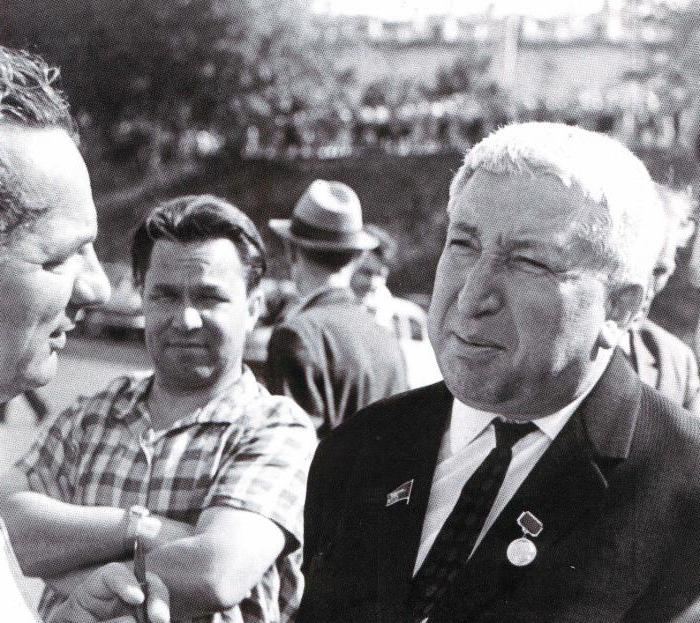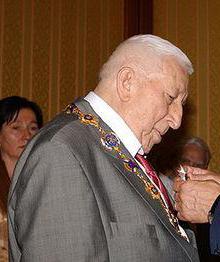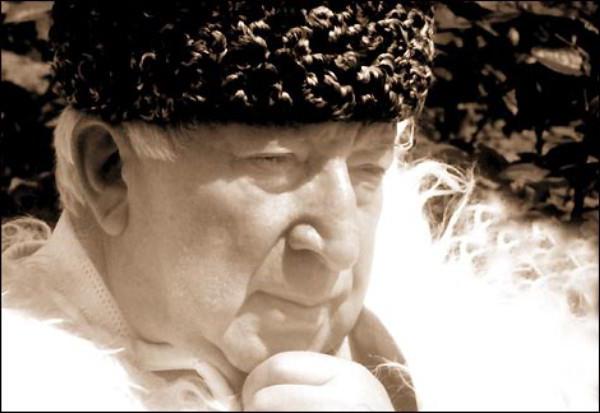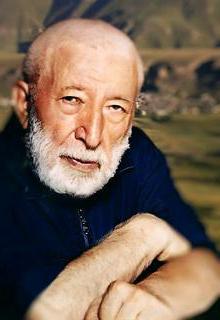The famous Avar poet of the Soviet period Rasul Gamzatov was born in 1923, September 8, in Tsada (this is a village in the Khunzakh district of the Dagestan ASSR). His father, Gamzat Tsadasi, was a national poet of his native republic, a laureate of the State Prize of the Soviet Union, and his mother, Handulay Gaydarbekgadzhievna Gamzatova (1888-1965), was a simple Asian woman, the keeper of the hearth.
School years
Like all Soviet children, at the age of 7, that is, in 1930, Rasul Gamzatov went to study at Araninsk secondary school, was a rather diligent, smart and inquisitive student. He especially liked to listen to his father's stories about the famous hero Shamil, who, having received eight wounds right in the heart, continued to fight. He was able with one blow of his saber to cut the rider along with the horse from head to toe. In addition, Rasul listened spellbound to the story of the brave naib Haji Murat. Later, he translated Leo Tolstoy's poem about this hero into his native language. Other favorite heroes of the future poet were the legendary Khochbar and the handsome Chokhsky Kamalil Bashir. All this is because Rasul Gamzatov’s nationality is Avar, and he was interested in all those stories that told about the heroic past of his people. He also liked to listen to songs to the words of the legendary singer of love Mahmoud. He knew about the history of his people precisely from these stories. And little Rasul really enjoyed listening to poetry written by his father. He soon learned them by heart.

Rasul Gamzatov. Biography: first steps as a poet
When the boy was only 9 years old, he wrote his first poems. From this day, lines from under his pen poured, as if from a cornucopia. They were about his native school, about his classmates, about teachers, etc. By the age of 13 (then Rasul Gamzatov had just moved to the 7th grade) in one of the Avar newspapers, namely in the "Bolshevik Gor", they published one of his poems. The famous writer Rajab Dinmagomaev, compatriot of the Gamzatovs, wrote a commendable review of this work. After that, Rasul kept publishing in various editions of the Khunzakh region, in the Buinaksk city newspaper, as well as in the republican weekly Bolshevik Gor. Since the young man did not have his own pseudonym, he signed with the creative name of his father - Tsadas. But one day a gray-haired highlander showed him his surprise at the changes in the style of his father. And in order not to be confused with Tsadas, he took as his pseudonym the name of his ancestor. Now he was a young Avar poet who bore the name of Rasul Gamzatov.

Youth
After graduating from the 8th grade of high school, the future famous poet applied to the Avar Pedagogical School in the city of Buinaksk. After 2 years, he was already a teacher and returned to his native school. After some time, he joined the Avar State Theater as an assistant director, and then got the job of the head of the department in the Dagestan newspaper Bolshevik Gor, where he also worked as his own correspondent. Further, fate brought him to the Dagestan radio, and for some time he was the editor of programs.
Moscow
After the end of the Great Patriotic War, in which he lost his brothers, Rasul Gamzatov moved to Moscow to study at the capital’s Institute of Literature. M. Gorky. The lacquer poet Effendi Kapiev was perplexed by this step, who, having heard his poems translated into Russian, was fascinated by the talent of the young Avar. By the way, before moving to Moscow, the young man was a member of the Union of Writers of the USSR. Gamzatov’s knowledge of Russian was more than insufficient for entering a literary institute, but the director, Fedor Vasilyevich Gladkov, liked the translations of his poems so much that, ignoring the many mistakes made by the young man in the dictation, he recorded him among the accepted students. Perhaps he already anticipated that he was facing a future famous poet, and not only in his homeland. Indeed, years later already throughout the USSR they knew who Rasul Gamzatov was. His biography of this particular period was the beginning of his career as a literary figure in the USSR.

Studying at the Institute. M. Gorky
Here at the institute, a young Avar discovered a lot of new things. Poetry was revealed to him in a new light. More and more acquainted with the work of various Russian and foreign authors, he fell in love with one or the other each time. Among his favorites were Blok, Yesenin, Bagritsky, Mayakovsky, and, of course, Pushkin, Nekrasov, Lermontov, and from foreign ones, Heine's works were very close to him. In 1950, the poet Rasul Gamzatov graduated from the institute. He later said that Russian literature made an indelible impression on him and on his work.
Social Activities and State Awards
After Rasul Gamzatov graduated from the Moscow literary and returned to his native Dagestan, he was elected chairman of the Union of Writers of the Autonomous Republic. He held this position for 53 years, until his death in 2003. In addition, he was elected first as a deputy, and then deputy chairman of the Supreme Council of the Dagestan Autonomous Soviet Republic, and after that he was already a deputy of the all-Union scale. He was also a member of the editorial boards of such authoritative publications as The New World and Friendship of Peoples (magazines), Literary Russia and Literary Newspaper, etc.
Rasul Gamzatov’s life was very busy: he constantly moved from Dagestan to Moscow, traveled a lot, met with fans of his talent, but most importantly, he always felt the attention and care of the state. It can be called a minion of fate. In those years, the state awarded various prizes to talented artists and awarded medals and orders. Gamzatov was a holder of the orders of Lenin (four times), the “October Revolution”, “Friendship of Peoples”, etc. Before his death in 2003, he received the Order of St. Andrew the First-Called from President V. Putin .
Rasul Gamzatov - poet
Even while studying at the institute, the first collection of verses of the famous Avar poet in Russian was published. After that, he was translated into the languages of other peoples of the USSR. The best works of the poet were: “Our mountains”, “My land”, “Year of my birth”, “The word about the elder brother”, “Homeland of the mountaineer”, “My heart is in the mountains”, “Dagestan spring”, “3arema” (1963 ), “And the star speaks with the star”, “The Third Hour”, “Cranes”, “Island of Women”, “My Dagestan”, “Judge me by the code of love”, “Constitution of the Highlander” and others. Almost every collection received a state prize. So, for example, for the “Year of My Birth”, the poet Rasul Gamzatov was awarded the USSR State Prize, and for the “High Stars” - the Lenin Prize.
Sage!
Mountains are said to make people special. Perhaps this is from proximity to God? Separated from the world, living far from civilization, real sages live among the mountains. From the works of Rasul Gamzatov, from his thoughts, it’s just breathtaking! They contain an incredible amount of wise sayings. Here, judge: "Glory, don’t, don’t touch the living ... sometimes you kill even the strongest and the best." It's amazing how much depth is in this one line! And here is how he represents happiness: "Happiness is not something that comes of itself when you are not looking for it, happiness is a city that was repelled in battle or rebuilt in the ashes."
Songs of Rasul Gamzatov
Many verses of the Avar poet wrote melodies. The songs were performed by such famous singers as the legendary Anna German, the world famous Galina Vishnevskaya, Joseph Kobzon, Muslim Magomaev, Valery Leontyev, Sofia Rotaru, Vakhtang Kikabidze and others.
Family of Rasul Gamzatov
The great Avar writer worshiped his parents all his life. Of course, his father would be the highest authority for him, but he had a special love for his mother. The life of a mountain woman is not so easy, so his attitude to her was careful. Here is a quote from one of his works: "I conjure: take care of your mother. Children of the world, take care of your mother." He was equally respectful of his wife. The poet had a rather large family. And as is customary in every Asian family, he was surrounded by the attention, reverence and care of his household. The wife of Rasul Gamzatov Patimat gave birth to three daughters. He did not have an heir. And the daughters gave him many granddaughters and not a single grandson. Perhaps, precisely because he was constantly surrounded by women, his attitude to the weaker sex was so reverent. He greatly appreciated their beauty, tenderness. Here are the lines that he devoted to his mothers: "For years, you have no power over a woman - and, of course, this is no secret. For children, all mothers are beautiful, so there are no ugly women!"

Memory
The great Avar poet died in 2003 at the age of 80. During his lifetime, he immortalized himself with his beautiful works. The governments of Russia and Dagestan have more than once decided to establish memorials to the great Avars both in Dagestan (there are a large number of monuments to Rasul Gamzatov here) and throughout Russia. In 2013, in the presence of Russian President V. Putin and the mayor of Moscow, a memorial to the great poet was inaugurated in the capital.